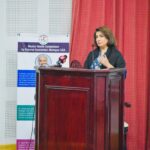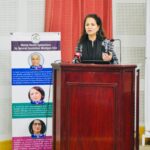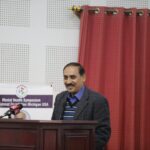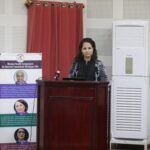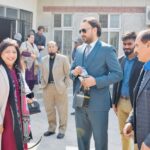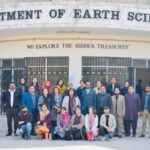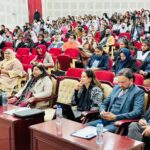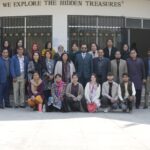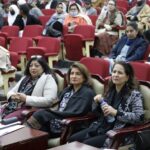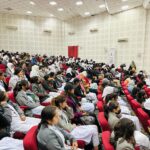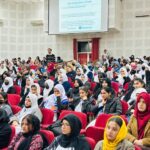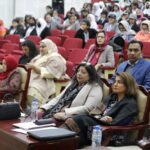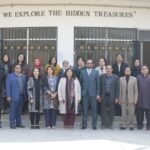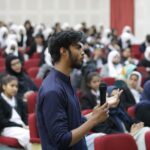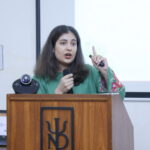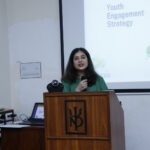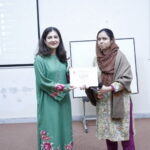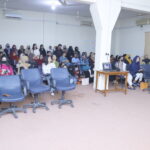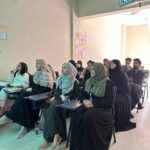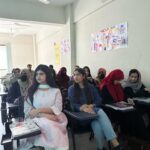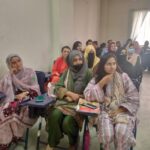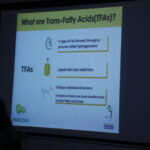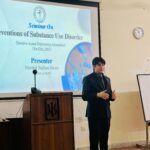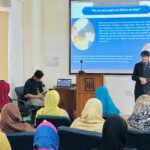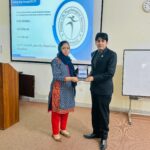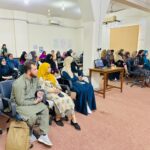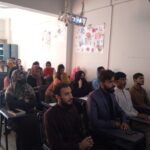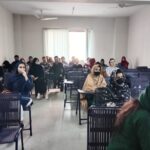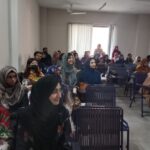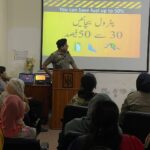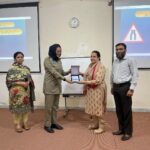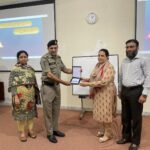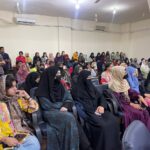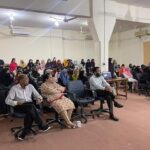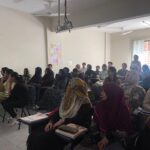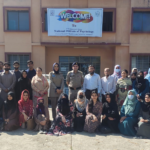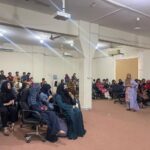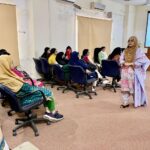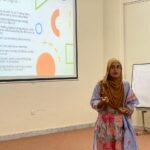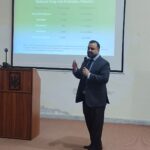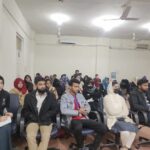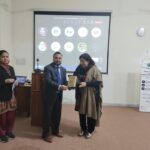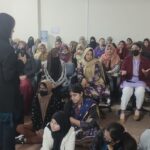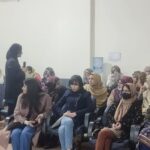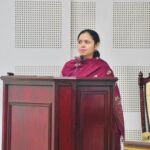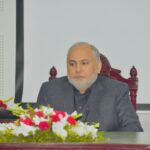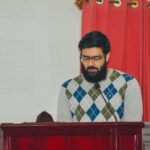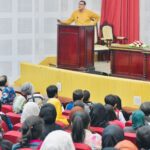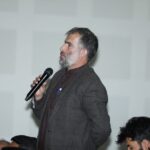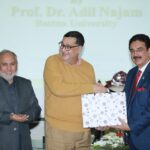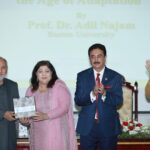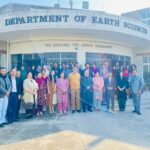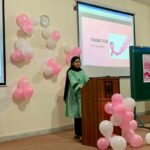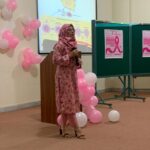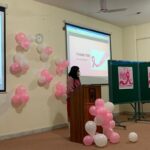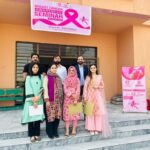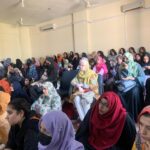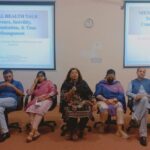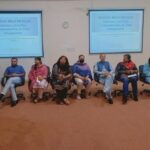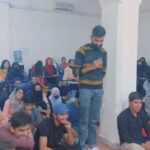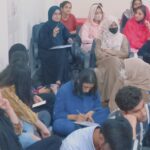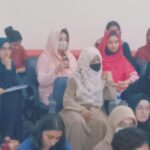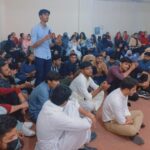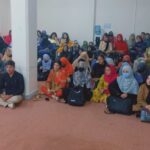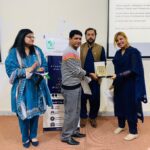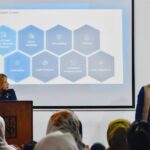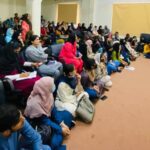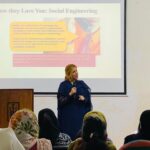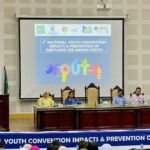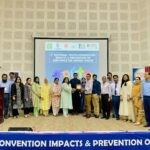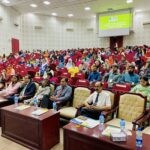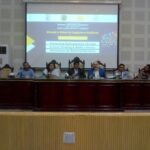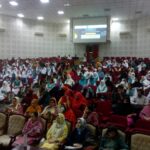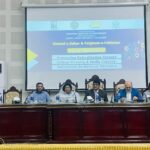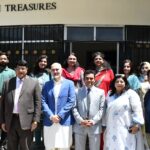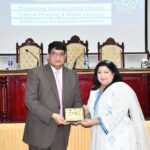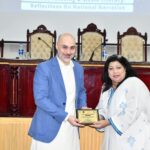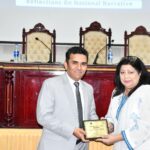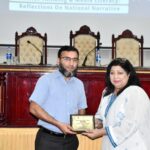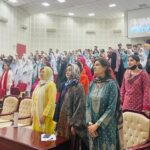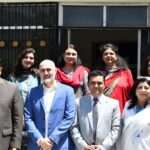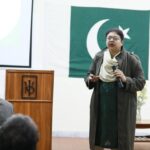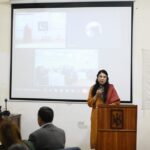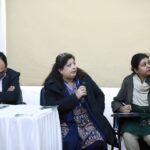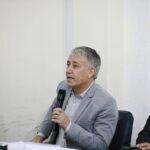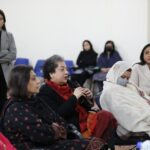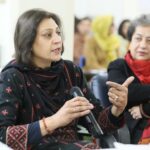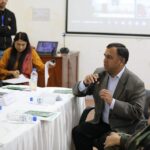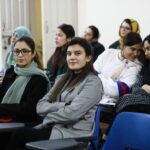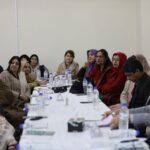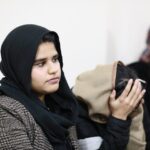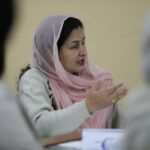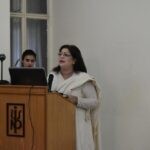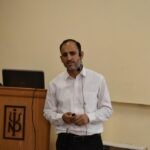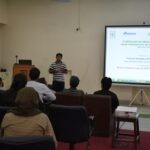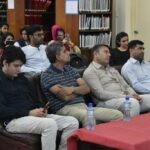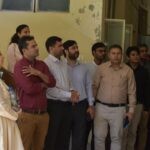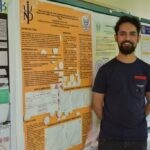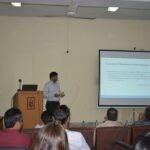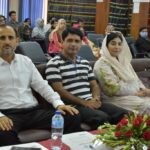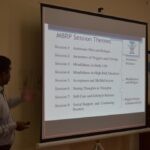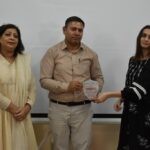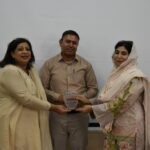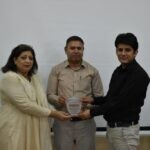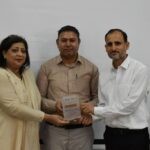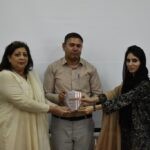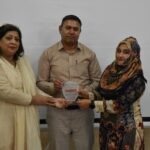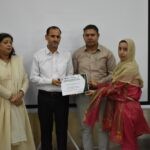NIPEvents
Training Workshops Held at NIP
National Institute of Psychology (NIP), Center of Excellence, Quaid-i-Azam University is very keen in providing opportunities for skills development and out-of-classroom trainings. Since its inception, high quality workshops and seminars have been organized. Student at NIP and students and professional from other organizations can take part in these activities to enhance their skills and employability.
Training and Awareness Workshops are used to explore a specific topic, to transfer knowledge, to solve identified problems, or to create something new. In funded research projects and other research endeavors, workshops are the mechanism used to gather the wider project, community, or interested people together around a particular topic.
Seminars, Symposium & Webinars
Symposium on Mental Health
February 13th, 2024
The Mental Health Symposium on February 13th, 2024 jointly organized by the National Institute of Psychology (NIP) and Rehmat Foundation was conducted at Earth Sciences Auditorium, Quaid I Azam University. The symposium concluded successfully, bringing together professionals, advocates, and students to discuss pressing issues in mental health advocacy, stress management, and perinatal mental health disorders.
The symposium commenced with the National Anthem and a Recitation from the Holy Quran. Dr. Mubashir Mushtaq Daha, Member Advisory Board of Rehmat Foundation, delivered the welcome remarks by shedding light on the significance of addressing critical mental health challenges. Distinguished speakers, including Dr. Huda Zenati Co-Founder Rehmat Foundation, Dr. Saba Syed M.D Board Member of Rehmat Foundation, shared their expertise and insights on stress management, and perinatal mental health disorders, respectively. Each session was followed by engaging Questions and Answers sessions, where attendees had the opportunity to interact with the speakers. Former Federal Secretary, Ministry of IT and Telecommunication; Chairman Taleem Foundation shed light on the worth of empowering youth particularly women from remote areas of Pakistan. Prof. Dr. Rubina Hanif, Director of NIP, delivered concluding remarks, emphasizing the importance of continued collaboration and community engagement in addressing mental health issues. The success of the Mental Health Symposium would not have been possible without the contributions of our esteemed speakers, the organizing committee, volunteers, and all attendees.
Moving forward, NIP and Rehmat Foundation are committed to building on the momentum generated by the symposium. Plans are underway to continue fostering collaboration, raising awareness, and implementing initiatives aimed at promoting mental health and well-being in the community.
Seminar on Transform Pakistan
7th November 2023
This seminar was conducted on 7th November, 2023. It was the fourth seminar of this semester. NIP is trying best to bring forth a variety in this seminar activity. For this particular reason this talk was planned to cater the concern about what we are eating. We do know that how often we are involved in unhealthy eating choices but we rarely realize about the associated hazards and harmful impact it has on our health.
An esteemed Team from Pakistan Youth Change Advocates (PYCA) joined in for this seminar who are working hard to transform Pakistan with advocacy on policy regulations about Trans-fatty acids. In line with this the seminar was titled as “TRANSFORM PAKISTAN: Youth Engagement for Regulating Trans-Fatty Acids in Pakistan.” One of the team member, Ms. Huma Jahangir who is working as Program Implementation Lead in Pakistan Youth Change Advocates was the speaker for this seminar.
In the beginning the speaker introduced what trans-fatty acids are and how they can become cause of different physical and mental health problems. The second part of the seminar was geared to orient students with the whole of process of contributing to transform Pakistan by becoming an active member. Insights and expertise of the speaker shed light on the critical issue of trans-fatty acids in our food supply and how the youth of Pakistan can actively participate in addressing this health concern.
In the end the team of PYCA was thanked for taking time to share their expertise and the seminar speaker was presented with a certificate as a token of appreciation on behalf of Director NIP Prof. Dr. Rubina Hanif. The seminar concluded that with collective efforts and the active engagement of our youth, we can truly transform Pakistan into a healthier Pakistan.
Seminar on Prevention of Substance Use Disorder
31th October 2023
Owing to the social responsibility of addressing the pressing issues of community a seminar was organized on Prevention of Substance Use Disorder. This seminar was conducted on 31st October, 2023 at National Institute of Psychology. The speaker for this seminar was Mr. Naveed Sultan Awan who is CEO and Mental Health Activities Manager at Happy Life Psychological Services (HLPS). This facility offers high-quality mental health care provided by a team of experienced experts, while maintaining affordability and compassion.
The seminar started off with a brief introduction of worthy speaker and HLPS, where remarkable efforts were reflected through the community level contributions that have done by HLPS team. This talk equipped students with the knowledge and tools that are necessary to prevent the onset of substance use disorders, promote healthier choices, and foster supportive environments that enable individuals to lead lives free from the grip of addiction. Mr. Naveed touched risk and protective factors both at minute and huge levels. For instance, he pointed out that there are individual reasons for getting involved in drug use and also some people get involved accidently. Some drugs generate depressive effects and others tend to activate the person. All in all challenging circumstances tend to pose threat and increase vulnerability. Those who are more skillful are thought to get out of faced problem. Preventive actions can be operated from family, school, or community levels before their reflection in health care setting.
The esteemed speaker was formally thanked in the end on behalf of Director National Institute of Psychology, Prof. Dr. Rubina Hanif and was presented with a shield as a token of appreciation. Audience was motivated to spread the word that substance use disorder is not just a personal struggle, it’s a societal challenge that demands our attention and collaborative efforts.
Seminar on Road Safety from National Highways and Motorway Police (NHMP)
10th October 2023
A highly dedicated team from National Highways and Motorway Police (NHMP) conducted a seminar on Road Safety at National Institute of Psychology. This seminar was organized on 10th October, 2023. Inspector Saqib Waheed and Sub Inspector Mehwish were the resource persons for this seminar. This initiative was taken by NHMP keeping in perspective their broader vision to ensure safe and secure driving environment on National Highways and Motorways all across the country. Mr. Saqib Waheed started it off by mentioning about their services to help the road users, their role in regulation of traffic, and enforcement of law. Prior to be on the road inspection of vehicles, route planning, adjustment of driving seat, and an appropriate understanding of sign boards is quite essential. Then, use of seat belts which is often not practiced is of great significance so as to reduce the intensity of accidents. Concentration on the road is definitely required for a safer driving experience. Speed limit is defined to advocate about upper bound speed not for fluctuating around it. Likewise, lower bound specifies that malfunctioning vehicles should not proceed with travel in that situation. Inspector Saqib specified about safe distance between vehicles in detail that varies with respect to type of vehicle and weather conditions. Salt range region was specified as having greatest number of fatal accidents, which calls for remaining extraordinarily cautious when driving on that patch. After careless driving and over speeding, dozing at wheel has been seen as an important cause behind fatal accidents that is peculiar to travel on motorways. Appropriate use of indicators for lane change or overtaking was highly emphasized. Sub Inspector Mehwish took over with reference to road experience of women. She specified that more discipline is observed in women when they drive but by taking note of manageable clothing and avoiding use of jewelry while driving can serve to rectify the issues that may evolve in their drive. The NHMP team ended up with sharing about their You Tube Channel named Drive Partners and a request to plan research related to driving behavior so that data based understanding of behavior can be generated and required steps can be take accordingly. In the end, NHMP Team was highly appreciated for such a useful talk on behalf of Director NIP Prof. Dr. Rubina Hanif. In the concluding session, both the resource persons were presented with shields.
Reported by
Sara Imtiaz
Seminar Coordinator
Seminar on Suicide Prevention
3rd October 2023
In connection to the month of September that is celebrated as suicide prevention month globally a seminar was organized on suicide prevention. This seminar activity took place on 3rd October 2023. This seminar was delivered by Ms. Sobia Kiran who is working as Clinical Psychologist in NIP Counseling Centre. She started with building a familiarity with basic terminology from self-harm to suicide. Also the alarming suicide statistics were shared where 10-14 years and 25-34 years are seen as the most vulnerable age groups among individuals who die by suicide. Individual, social, and environmental risk factors along with protective factors were thoroughly discussed. Likewise, an understanding was developed regarding verbal and behavioral signs of individuals with suicidal tendencies. Ms. Sobia also mentioned about assessing suicide risk levels and taking preventive steps against suicidal thoughts. A case was dramatized to depict adequate handling of someone having suicidal intent. The seminar activity ended with a note of thanks to the speaker and an urge to audience to stay vigilant about anyone having suicidal tendencies and affectively dealing such a person.
Reported by
Sara Imtiaz
Seminar Coordinator
Seminar on Substance Use Disorder: Our Roles and Responsibilities
26th December, 2022
Seminar on ‘Substance Use Disorder: Our Roles and Responsibilities’ was held on 26th December 2022 at National Institute of Psychology. This Seminar was planned in collaboration of Hometown Community Foundation which is geared to remove barriers through collaborative efforts for humanity. Particularly, HCF has a mission to save lives from substance abuse. The worthy resource person for this seminar was Dr. Nauman Ashraf who is Associate Professor of Clinical Psychiatry at University of Missouri, School of Medicine. He is Chairperson Association of Physicians of Pakistani Descent of North America, Founding Program Director of Addiction Medicine Fellowship and Psychiatry Residency at Kansas City University. He has certifications in Addiction Medicine and Addiction Psychiatry. Earlier he did his MBBS from Liaquat University of Medical & Health Sciences and did with Psychiatry Residency certification from New York University.
Dr. Nauman Ashraf started off with a discussion on factors that contribute to substance use and how exposure to drugs at an early age makes the youngsters prone to substance abuse. He said that as dual earning couples are trending, this is leading towards non-availability of parents for children who are growing up. The lack of support from parents gives rise to poor coping skills. The raw emotions go unaddressed and creates problem for the person as sharing about emotional problems is a taboo in our society. In order get away from the confronted pain the relief is obtained by falling prey to drugs. The process of consuming drugs starts off by consumption in small amount. Slowly and gradually the consumed amounts are increased and the person becomes addicted to drugs. The addict then runs out of money in view of this increased need. When social ties of the person get disrupted, the person is actually working out towards burning the bridges for him/herself. Moreover, the potential for criminal activity rise up. The problem in the whole scenario is the mindset that “I cannot help it”. Within such circumstances the person requires the help from health care practitioners.
Some neurological evidence was shown where brains of addicts as compared to non-addicts were indicated to have much less activity. On the way towards addiction, the working of prefrontal cortex, which works to apply breaks, is derailed and in process brain is thought to be hijacked. When this happens the accelerator gets so paced off that brakes do not work. As a result there come changes in sleep, appetite, mood and other domains. Such that the person becomes irritated, withdrawn or isolated predominantly. However, it has been witnessed that weaknesses in the addict brain can go away gradually. Particularly, Dr. Nauman highlighted that when help is provided the people have been seen to come, revive and thrive. In doing so it is worth to mention about the role of peer specialists, who can come up with better results as compared to practitioners, the reason being they have lived those experiences themselves.
Dr. Ashraf made the point that substance use disorder is a chronic condition just like diabetes and hypertension so the issue is to be managed. Also relapse and remission are quite common. For treatment purpose, Dr. Nauman talked about the Medications and the Collaborative Care Model that is to be followed where we need everybody on board whether it is students, teachers, religious scholars, police and others. By collaborative efforts we need to create awareness and decrease stigma.
The audience actively engaged in this talk by pouring in their questions and greatly benefiting from the knowledgeable talk by Dr. Nauman. Overall, the session was very informative and included important aspects related to drug abuse. The talk ended with handing over of some tokens of appreciation to Dr. Nauman and with a note of thanks to Hometowm Community Foundation for keeping up with the collaborative work for the good of society.
Reported by
Sara Imtiaz
Seminar Coordinator
Seminar on Evidence Base for CBT for Generalized Anxiety in Young People
20th December, 2022
This seminar was organized from the forum of Tuesday Seminar and was conducted on 20th December 2022. The resource person for this seminar was Ms. Sarfraz who is a trainee teacher of Religious Studies at University of Cambridge doing Master of Education. She has a key interest in helping groups who are struggling with poverty and poor mental health and the overlap between the two. She has a BSc in Psychology and an MSc in Global Mental Health (Distinction). Her BSc dissertation focused on stress and resilience and her MSc dissertation focused on the development of schizophrenia amongst marginalised groups, particularly British Pakistanis and Bangladeshis in the UK. She believes that education is the best way to equip disadvantaged populations to overcome social problems.
The speaker started it off by explaining about what CBT is, that is, changing the unhealthy thoughts with the healthy ones. She mentioned that how our thoughts, feelings, and emotions are interconnected and working on thoughts yield results in affective and behavioural domains too. Explaining about Beck’s cognitive triad she said that we have certain beliefs about self, about the world, and about future. The problem actually lies in one’s core beliefs that take toll from a person. Ms. Sarfraz talked about Generalized Anxiety Disorder that how it is different from general anxiety that all of us have. Dealing with generalized anxiety disorder requires one to register that it is often presented with comorbidity. Explaining about the stages of cognitive development by Jean Piaget Ms. Sarfraz specifically talked about how it would be different to apply CBT to young individuals and children. Talking about limitations of the use of CBT Ms. Sarfraz highlighted the value of training it requires to perform CBT. Lack of training makes way to malpractices in its application where current developmental level of the person is not kept in focus. Importantly, significance of CBT as a technique was highlighted through evidence base that exist in a hierarchy. The public opinions and case studies lies at the base of the pyramid, whereas evidence from randomized controlled trials and systematic reviews lies at the top. Participants enjoyed this interactive seminar and actively participated in question and answer session.
In the end, speaker was thanked on behalf of NIP Director Prof. Dr. Rubina Hanif for taking the initiative to interact with students of NIP and was presented with a token of appreciation from NIP. Ms. Sarfraz also expressed about having a great experience through this opportunity to have a talk. This activity ended with a note of thanks for audience.
Reported by
Sara Imtiaz
Seminar Coordinator
Seminar on Climate Change and Pakistan in the Age of Adaptation
10th November, 2022
National Institute of Psychology organized a Seminar on Climate Change and Pakistan in the Age of Adaptation on 10th November, 2022 in the earth sciences auditorium. This seminar was delivered by Prof. Dr. Adil Najam. This activity was attended by honorable Vice Chancellor, Quaid-i-Azam University Dr. Muhammad Ali and Dean Faculty of Social Sciences.
Dr. Adil is currently serving as Dean of the Frederick S. Pardee School Global Studies, Boston University. He has also taught at MIT and Fletcher School of Law and Diplomacy, Tufts University. He has also served as Vice Chancellor Lahore University of Management Sciences. Dr. Adil was part of the scientific panel that was awarded the 2007 Nobel Peace Prize for advancing the public understanding of climate change science. He has also worked as UN Committee on Development Policy (CDP). He was a member of the President of Pakistan’s Special Task Force on Human Development (2001) and has served on Pakistan’s Presidential Commission on Higher Education (2002). In 2010 he was awarded the Sitara-i-Imtiaz (Star of Excellence), one of the Pakistan’s highest civil awards by the President of Pakistan. In 2019 he was appointed to the Prime Minister of Pakistan’s Advisory Council on Foreign Affairs. Currently Dr. Adil is working in the capacity of Senior advisor at Jinnah Centre for Character and Leadership that has been established at PF Academy Risalpur in collaboration and consultation with NIP.
The proceeding of seminar started with recitation of Holy Quran and was followed by a welcome address by Prof. Dr. Rubina Hanif, Director National institute of Psychology, Quaid-i-Azam University. Then Dr. Adil started it off by making a point that Climate Change is the Biggest Security Threat that we are facing, all other threats comes secondary. Through his engaging presentation he proved this point by pointing to fact that how global warming is increasing the temperature of earth. Using the example of Suzuki effect he said that as a car gets heated up when it is left out directly in sun. The science behind this heating is that the heat gets trapped into the car as there is no place to vent it out, which is actually the greenhouse effect. So the temperature of earth is increasing day by day in a similar manner but earth has no venting outlet because of which we are facing this issue. Deforestation is also an important matter of concern, specifically war ridden areas are evacuated and when people settle down in some localized areas deforestation happens. Population readjustment was also discussed from the perspective of Vanuatu, which has an international agreement with New Zealand to accommodate their population in case they sink down in water. But what of rest of the world what would they do?
Dr. Adil mentioned about consensus of scientists that human induced earth’s increase of temperature should not be more than 1.5C but then they increased this threshold to 2.0C. Talking about repercussions of 0.5C it was mentioned that it makes the glaciers to melt with ten times increased pace and 2.5% decrease comes in crop production. Political negligence was pointed out as a big reason of not being able to reach any workable solution as politicians have been attending COP for quite long but action oriented approach had been missing that has aggravated the issue to such gross level. Importantly, those who are contributors of this devastation are other countries but the affectees are other countries and Pakistan is one of the affectee.
On a lighter note he mentioned that today Lahore has an additional season of smog and Karachi has an additional season of heat wave that are brought about by the climate change. Talking about recent floods in Pakistan, Dr. Adil mentioned that it was mere inattention to three important signals that clued upcoming floods, including the heat wave, drought, and cloud burst earlier this year. Particularly he mentioned that these floods did not happen unknowingly rather it was the 12th consecutive year of higher than expected floods in Pakistan. Talking about solutions, he mentioned about conserving the Indus Basin. Because Indus basin is the one that is inhabiting people around, from almost 5000 years. Specially monitoring water of Indus all through the country is the need of hour. Moreover, he mentioned that in addition to building dams it is also useful to replicate the idea of billion trees with building billion pounds. With reference to changing personal habits Dr. Adil mentioned about adopting the sharing practices that can serve to deal with issue at hand. After the talk, Dr. Adil patiently answered the posed questions in the question answer session.
Dr. Muhammad Idress shared that this talk proved to be an eye opener for all of us that demand actions to be taken at priority. Dr. Muhammad Ali endorsed the idea of conserving Indus Basin and additionally raised the point to control increased urbanization that can be done by providing facilitation in the rural areas so that we can keep them inhabited and people can generate livelihood from there. In the end, souvenirs were presented to the Resource Person and the Guests of Honor.
Reported by
Sara Imtiaz
Seminar Coordinator
A Seminar on Breast Cancer Awareness
25th October, 2022
Mental Health Talk on Tolerance, Incivility, Communication, and Time Management
18th Oct. 2022
The Tuesday Seminars forum arranged a Mental Health Talk on 18th October, 2022. This was organized keeping in view the need to provide students with a forum to bring in their problems. This talk was focused on the issues of Tolerance, Incivility, Communication, and Time Management. This talk was facilitated by Ms. Sara Imtiaz.
After formally welcoming the students and worthy faculty members Director Institute Prof. Dr. Rubina Hanif shed the light on the importance of Mental Health. She said that we owe to organize such talks since we belong to the psychology community. Mentioning in connection to the historical context Dr. Rubina highlighted how revealing about Mental Health Issues has been stigmatized from the earlier times which is the very reason that these issues are not openly talked about. She elaborated on how problems can emerge in different domains of life whether it is academics, family, relationships etc. About dealing with Mental Health issues she mentioned the importance of self-assessment, flexibility and objectiveness in interpreting the life events, and taking multiple perspectives. She highlighted about difference in interpreting situations on healthy lines by discussing examples from lives of students. Importantly Dr. Rubina said to students that if something is bothering you it should be conveyed so that steps can be taken to rectify it.
Dr. Imran Bukhari explained the notion of tolerance from sociological standpoint. The specific reasons underlying extremist views. Particularly he talked about extremist literature and adopting a dispositional style of attribution that makes way to generating intolerance within our society. Dr. Nelofar Rauf further talked about accepting diversity to overcome intolerance. In order highlight its significance she mentioned that acceptance of diversity is something that is adopted worldwide by different organizations so as to enhance productivity.
Ms. Raiha Aftab talked about how our behaviors become uncivil. These include those behaviors where one becomes violent. This happens because one thinks that his/her rights are not provided or there is perceived injustice or perceived isolation. In order to stay away from such behaviors she mentioned about trying to understand the context of the situations.
Dr. Sobia Masood helped the audience understand about important aspects of communication. In addition to verbal and non-verbal behaviors, Dr. Sobia mentioned listening to be important part of communication and importance becoming active listener. Verbal communication was explained in terms of different styles of communication. Adopting assertiveness in communication was required for having better communication by serving both parties involved.
Ms. Riffat Zahir talked about time management. She said that from among the too many tasks at hand one has to decide and set priorities for doing different tasks. If one actively specifies the hurdles that are keeping various tasks undone one is in better position to manage doing those tasks. Therefore identification of distractions is important.
Dr. Naeem Aslam discussed that how Mental Health is not just absence of disease. It has close ties to one’s physical health which can be attained by proper diet, doing exercise, and getting proper sleep. For attaining Mental Health he shared that how important it is to consume mental candies which can be reading a good book for one person or spending time with nature for another.
After the overview of different domains NIP students actively discussed about the confronted problems which were adequately addressed by faculty members. One of the students appraised organizing Mental Health Talk for students where students can have a different exposure than class room settings and where students can put forth their issues to be addressed by the experts.
In the end discussion was concluded on a note that mental health issues are real not fake. Removing stigma from it should be our focus so that these issues can be brought under discussion in order to deal them in an adequate manner. For doing this small practical steps are required which when taken can not only help one to stay away from mental health issues rather they would also help others around by putting them at ease. In a nutshell, “it’s OK not to be OK”. Acquiring certain useful skills better equips an individual to handle life adversities.
Reported by
Ms. Sara Imtiaz
Tuesday Seminar Coordinator
Islamic Psychology and Spiritual Wisdom
Prof. Dr. Muhammad Tahir Khalily Professor of Clinical Psychology and Dean Faculty of Social Sciences & Humanities Shifa Tameer-e-Millat University, Islamabad 27th April, 2022
On 27th April, 2022, Prof. Dr. Muhammad Tahir Khalily (Professor of Clinical Psychology and Dean Faculty of Social Sciences & Humanities, Shifa Tameer-e-Millat University, Islamabad) delivered a seminar titled Islamic Psychology and Spiritual Wisdom at NIP. The seminar had been jointly organized by the National Institute of Psychology, QAU, Islamabad and Rehmatul-lil-Aalameen Authority, Govt. of Pakistan. Prof. Dr. Tanvir Anjum (Tenured Professor, Department of History, Quaid-i-Azam University, Islamabad) who is also serving as a member of the Rehmatul-lil-Aalameen Authority attended the seminar as its representative.
The activity commenced with the recitation from the Holy Quran and its translation followed by a ‘naat’ recital by two NIP students: Hafiz Muhammad Akbar and Tania Ashraf. Later the Rehmatul-lil-Aalameen Authority, Govt. of Pakistan was introduced by Prof. Dr. Tanvir Anjum after which Prof. Dr. Muhammad Tahir Khalily commenced his insightful talk in which he comprehensively covered content on spirituality, religiosity, maladies of ‘nafs’, Muslim psychology and Islamic Psychology and conventional western psychology. He also shared a list of scholarly reading material including books and journal articles for further reading and research. After a question/answer session, NIP Director, Prof. Dr. Rubina Hanif gave her concluding remarks and thanked both esteemed guests for their time and presence. The activity came to a close with the distribution of shields to the guests and a group photo with them.
Effects of Drug Addiction on Brain and Body
Hometown Community Foundation
12th April, 2022
A team from Hometown Community Foundation (HCF), a non-profit organization striving to save lives from substance use related deaths, delivered an awareness seminar titled ‘Effects of Drug Addiction on Brain and Body’ for NIP students on 12th April, 2022. On this occasion, an information desk was also set up by HCF to share relevant information with the students and distribute forms amongst them for joining the organization as volunteers.
The seminar was delivered by Ms. Mehwish Tariq (CEO, Hometown Community Foundation) and Ms. Rabya Ghafoor. The speakers shared comprehensive information related to the issue of drug addiction and the initiatives that their organization takes in this regard; empowering individuals and families with knowledge to give an understanding of substance abuse disorder and addiction and providing strategies to fight against substance abuse as their primary focus. The speakers encouraged the students to join the organization as volunteers and researchers to connect to a global network of people making a difference in their own lives in their communities and in the world. They were also asked them to visit the information desk set up by HCF on NIP premises on this occasion to get forms to register for volunteering opportunities with HCF.
Cybercrimes and Cyber Security
Cyber Crime Wing, FIA
15th March, 2022
On 15th March, 2022 an awareness seminar titled ‘Cybercrimes and Cyber Security’ was delivered by Ms. Zooni Ashfaq and Mr. Najeeb ul Hassan from the Cyber Crime Wing, FIA. The activity was attended by a fully packed house of students who received the activity with immense interest.
While introducing their FIA wing, the speakers shared that the Cybercrime Wing (CCW) of Federal Investigation Agency (FIA) deals with the growing threats of cybercrimes and is the only unit of its kind in Pakistan which directly receives complaints and take legal measures against cyber criminals. The awareness seminar covered rich and important information with the audience including the importance of cyber security, types of cybercrime, secure usage of smart phones and other electronic devices, secure browsing, keeping one safe on the web and social media platforms, dark web services, social engineering and being cyber wise. On this occasion, information leaflets were also distributed among the attendees besides gifts which were given to the students for asking pertinent questions. In the end, the speakers were thanked for their time and input and tokens of appreciation were presented to them for doing a commendable job.
Awareness of Drug Abuse Prevention
(28th December, 2021)
A seminar on awareness of drug abuse prevention was organized by students of BS-I as part of their awareness campaign, for which Chairperson of Kareem Khan Afridi Welfare Foundation was invited on 28th December, 2021. Christina Afridi founded this organization after the death of her only child Kareem due to over-dosage of drugs. She talked about different types of drugs including heroine, ice, tobacco, cocaine and even prescription drugs which are being misused nowadays. She emphasized that teenagers need to defend themselves against drug usage and cut ties from anyone who is habitual user of drugs; she called it self-defense technique. She urged the audience to spend their energy in constructive physical activities like sports. She emphasized on the role of social connections and social support and, particularly, addressed for adults to reduce their mobile time to connect with their younger generation in real time.
Remembering Dr. Akhter Ahsen
(21st December, 2021)
The National Institute of Psychology held a webinar in memory of the revolutionary Dr.Akhter Ahsen on the 21st of December, 2021 who is known as the father and founder of Modern Eidetic Psychotherapy. Panel members included Dr. Akhtar Ali Syed (Principal Clinical Psychologist at Brothers of Charity Services), Dr. Shazia Neelofur (Principal Clinical Psychologist at Brothers of Charity Services), Prof. Dr. Asir Ajmal (Dean Faculty of Arts and Social Sciences, Gift University, Gujranwala) and Prof. Dr. Rubina Hanif (Director NIP).
Patient Participation in Chronic Illness Management
(14th December, 2021)
A seminar titled “Patient Participation in Chronic Illness Management” was delivered on 14th December, 2021 by Dr. Muhammad Junaid who is Assistant Professor of Marketing, Tourism, and Hospitality Management at the School of Management Sciences at Quaid-i-Azam University, Islamabad to enlighten the students with the importance of patient education and patient participation in managing chronic illnesses such as diabetes, hypertension, and asthma etc. Dr. Junaid highlighted the importance of management skills in healthcare facilities. The crux of the seminar was educating the audience about importance of actively learning about the reality and management of their diseases with a point that knowledge about one’s disease increases their perception of control over it. Better education, active involvement in treatment, and psychological consideration leads to satisfaction.
Teach for Pakistan 2022 Fellowship
(30th November, 2021)
On 30th November, 2021 a seminar was held at NIP by Teach for Pakistan by their representative Ms. Maleeha Waleed. Teach for Pakistan provides our nation’s top graduates the opportunity and support to teach for two years in low-income communities through a unique fellowship and develop the skills and convictions to lead education reform from across the social and economic systems. Seminar was helpful in generating empathy for situation in low-income communities schools during lockdown i.e., lack of electrical gadgets and internet connectivity. Audience also learnt about the need of teachers who possess the qualities of understanding, empathy, dedication, and flexible pedagogy skills and application of these personality traits while working in low-income community schools. Additionally, students in the audience were informed about the selection process of the organization and were encouraged to take part in fellowship to be a part of educational revolution in Pakistan.
Risk Factors for Adverse Outcomes with COVID-19 Infections and its Management
(26th October, 2021)
On 26th October, 2021, Dr. Farhan Abdul Rauf (Doctorate of Medicine, Doctorate of Philosophy, Masters in Public Health (MPH) from Kazakhstan and Ukraine, respectively) delivered a seminar titled “The Risk Factors for Adverse Outcomes with COVID-19 Infections and its Management” at NIP. Learning outcomes of the seminar included identification of risk factors including anemia, poor oral hygiene, dehydration, lack of required exercise, poor ventilation, consumption of tobacco or alcohol, and lack of exercise. All of these conditions can enhance the damage of COVID-19 profoundly. Audience also learnt that all these unhealthy behaviors can be precursor of four diseases which are responsible of 60% deaths around the globe that is; heart problems, diabetes, hypertension, and cancer. Dr. Rauf encouraged audience to look at their unhealthy life patterns in order to replace them with healthy lifestyle after attending his seminar.
Opinion Articles: Overview and Advantages for First Time Publishing
(28th September, 2021)
On September 28, 2021 an online seminar was delivered by Ms. Laura Gallo who is working as Director of Marketing at Applied Neuroscience Association (ANA) and as Customer Relationship Management Executive at Page Group United Kingdom. She spoke about her experience of publishing an opinion article before doing a PhD. Ms. Laura shared that opinion articles provide your insight to the research work. It can be taken as an avenue to share new perspectives for future research. While mentioning the things to consider while writing opinion articles, the first and foremost thing that was highlighted was to pursue your interests as with any kind of research since the process is time consuming. She also highlighted the importance of taking breaks in between and that one should never rush toward writing.
Seminar by PAHSRF
Managing Director PAHSRF Maj. Syed Azhar Shah (Rtd.)
CEO PAHSRF Ms. Sana Azhar
21st September, 2021
On September 21, 2021 an online seminar was delivered by Managing Director PAHSRF Maj. Syed Azhar Shah (Rtd.). Maj. Azhar and CEO PAHSRF Ms. Sana Azhar are proud parents of a son with Autism and two daughters with Asperger’s Syndrome. Different parenting demands of parents of children with special needs and scarce facilitation at every level of service motivated both the parents to work for generating awareness about Autism Spectrum Disorder (ASD). Pakistan Autism Health Sciences and Research Foundation was established in 2017 to fulfill this very aim. The seminar was based on two parts where the audience were told about what autism is and what areas of functioning are different among autistic individuals than non-autistic individuals. The second part covered initiatives taken by PAHSRF to address the issue at hand. It was shared that no two individuals with autism are alike, the manifestation of specific features is different among different individuals, prominent ones being repetitive behaviors and sensory issues. It was shared that it would not be wrong to say that brain wiring of individuals with Autism is different. This is the very reason that their affective, behavioral, and cognitive functioning are very different from normal individuals. In a family if one child is autistic, it increases the tendency for other siblings to have the problem. Though the condition is mostly there from birth but few may develop it over the course of their lives. About PAHSRF, it was shared that this initiative was taken up to turn down the stigmatization against individuals having ASD. The aim was to equip these individuals with various self-help skills so as to make them contributing members of the society. Certified training given to parents, teachers, and the Autistic individuals are also part of various endeavors being executed by PAHSRF. Collaborative efforts are also being done by joining hands with other institutes and organizations. The initiatives taken by PAHSRF includes reaching out to individuals with disability within the country and bringing in the expertise from the international front to facilitate groundwork being done for individuals with ASD and those linked to them.
4th Youth Convention
4th NATIONAL YOUTH CONVENTION
IMPACTS & PREVENTION OF SUBSTANCE USE AMONG YOUTH
Anti-Drug Poster Competition & Cultural Show
06 July 2023
Umeed-e-Sehar
Panel Discussion on
Preventing Radicalization: Critical Thinking and Media Literacy on National Level
May 27, 2024
A panel discussion was organised under the banner of Umeed e Sehar (life is precious) and Paigham e Pakistan. The panel discussion was held on 27th May 2024. The panellists included: Dr. Zia Ur Rehman, Professor Dr. Muhammad Zia-ul-Haq, Director General of the Islamic Research Institute and Professor of Shariah & Islamic Law at International Islamic University, Islamabad, Pakistan; Mr. Haris Qayoom, Chief Executive Office, Hashoo Foundation; Professor Dr. Rubina Hanif, Director National Institute of Psychology, Quaid-I-Azam University, Islamabad; Professor Dr. Muhammad Rizwan, Chairperson, Department of Psychology, University of Haripur, and Dr. Imran Bukhari, Assistant Professor, National Institute of Psychology, QAU,
The panel also highlighted that radicalization in Pakistan is a significant and complex issue influenced by a variety of factors, including historical, political, social, and economic conditions. Understanding these factors is crucial for developing effective strategies to counteract radicalization and promote peace and stability in the region. Pakistan’s geopolitical situation plays a significant role in the radicalization landscape.
The panel talked about the fact that the main problem occurs when the national narrative is overwritten by local and specific ideologies that are radical to the state. Our youth, with considering the source and purpose of the counter narrative starts internalising a negative world view. It causes them to become isolated, marginalised, and easy targets. The panel also highlighted high levels of poverty and unemployment, particularly among the youth, create a fertile ground for radicalization. Extremist groups often exploit economic grievances to recruit members. Also, lack of access to quality education and healthcare exacerbates social inequalities and fuels discontent.
The panel laid emphasis on reducing the ‘poverty of knowledge and training’ which is prevalent in our families and educational institutions. We need to inculcate critical thinking in our students and children from a young age. By teaching individuals to analyse and question information critically we can help in reducing susceptibility to extremist propaganda, it is essential that we filter the information that is being flooded through social media. Concurrently, we also need to start disseminating the national narratives at all levels of the community. Efforts are need to enhance skills to recognize and evaluate the credibility of information sources and identify misinformation and extremist narratives.
Community Engagement can be achieved through strengthening community bonds and fostering environments where individuals feel valued and supported, reducing the appeal of extremist groups. Promoting understanding and tolerance among different religious and cultural groups to prevent divisions that extremists exploit. We need to intervene very early before signs of radicalization and individuals at risk, such as sudden changes in behavior, withdrawal from community, or adopting extremist rhetoric take deep root.
The panel reiterated that we need to develop a national and local strategies that address all aspects of radicalization, from prevention to intervention and rehabilitation. Radicalization in Pakistan is a multifaceted issue requiring a comprehensive approach that addresses its root causes. This includes political reforms, economic development, educational improvements, and effective law enforcement. International cooperation and regional stability are also vital for addressing the broader geopolitical factors that contribute to radicalization. Through sustained and coordinated efforts, Pakistan can work towards reducing the threat of radicalization and promoting a more peaceful and inclusive society.
Preventing radicalization requires a holistic approach that addresses the root causes, educates, and empowers individuals, engages communities, and provides support and intervention where needed. By fostering environments of inclusion, understanding, and resilience, societies can mitigate the risk of individuals being drawn into extremist ideologies and actions.
Webinar on Ethnic Tolerance under the project of Umeed-e-Sehar
19th April 2023
National Institute of Psychology held a webinar on Promoting Ethnic Tolerance Among Pakistani University Students on 19 April, 2023 under the project of Umeed-e-Sehar. The webinar was attended by faculty and undergraduate students of Department of Psychology, Karakorum International University, Gilgit and NIP. Speaker of the webinar was Dr. Aisha Zubair, Assistant Professor at NIP who emphasized the importance of ethnic tolerance and narrated the specific techniques that can be used to augment ethnic tolerance among university students of Pakistan. She further reflected on the mechanisms through which university students can develop self-initiated skills to build upon enduring and sustainable resilient community.
Umeed-e-Sehar: Life Is Precious Psycho-Social Risk and Protective Factors of Delinquent and suicidal Behaviours
13th Feb. 2023
A consultative national meeting “Umeed-e-Sehar: Life Is Precious Psycho-Social Risk and Protective Factors of Delinquent and suicidal Behaviours” was held.
The first consultative national meeting of Umeed-e-Sehar was organized by National Institute of Psychology, Centre of Excellence, Quaid-i-Azam University Islamabad on 13th February 2023. The meeting was attended by representatives of important stakeholders including the Ministry of Human Rights Government of Pakistan, the Government of Gilgit Baltistan, Hashoo Foundation, Agha Khan Foundation, Representatives from Jinnah Centre for Character and Leadership, Quaid-i-Azam University, Karakorum International University and Fatima Jinnah Women University among others.
The participants in the meeting discussed factors and causes related to the increasing number of suicides in the province of Gilgit Baltistan (GB) in the recent past. The participants expressed their views and discussed ideas about what actions need to be taken at National level to help and curb the menace in the community of Gilgit Baltistan specifically and other provinces generally. They deliberated upon strategic interventions that need to be developed and implemented to help the suffering community.
In this regard, National Institute of Psychology shared that they have already developed an action plan with the help of the Hashoo Foundation and representatives of MoHR, Govt. of Pakistan, Social Welfare Department, Govt. of GB. It was shared that the first step in this regard was to collect information about the nature and extent of problems. Interviews and focused discussions were carried out with individuals from the community and representatives of local government. A number of factors were discovered. A general list of factors that were found was related to mental health issues, lack of opportunities for the educated youth, lack of communication between parents and children, the financial disparity in the region, a lifestyle marred by difficult weather patterns and conservative values, and lack of positive outlets.
The participants unanimously decided that psychosocial interventions are needed to build the resilience of the local community in GB. It was not acceptable to the participant that even one more life should be lost due to hopelessness or adverse circumstances. Each individual in the community deserved to feel content and valued. Representatives of Govt. of GB assured that it is already motivated to offer support to the grieving families and community; they reiterated that all possible support will be provided for the action plan that is developed under Umeed-e-Sehar. Hashoo Foundation and Agha Khan Foundation are committed to provide logistic and technical support in the upcoming phases of the project.
Symposiums Held at NIP
One-Day Symposium on Drug Addiction:
From Prevention to Intervention
By Dr. Naeem Aslam and Dr. Jamil A Malik in collaboration with Hosla Addiction and Psychiatric Treatment Centre and International Society of Substance Use Professionals ISSUP-Pakistan
28th June, 2022
On June 28, 2022; National Institute of Psychology organized its first ever symposium on the topic of “One-Day Symposium on Drug Addiction: From Prevention to Intervention” in collaboration with Hosla Addiction and Psychiatric Treatment Centre and International Society of Substance Use Professionals. They graced the inauguration of the ceremony with their presence which was followed by the welcome address of the Director of National Institute of Psychology (NIP), Prof. Dr. Rubina Hanif. Organizers of the symposium, Dr. Naeem Aslam and Dr. Jamil Malik, presented keynote addresses in which overview of prevention and intervention of drug abuse and drug abuse in youth were discussed. Symposium was conducted in hybrid mode in order to accommodate a wide range of research work from all over Pakistan. Experimental studies articulated the effectiveness of mindfulness based relapse prevention and compassion focused therapy in treatment of drug abuse. Remaining papers focused on the psychological process of individuals with drug abuse and their caregivers. Symposium also included a poster presentation competition. Junaid Ghazali, MPhil scholar of National Institute of Psychology, won the poster competition. The title of the poster was “Stress and Problematic Online Gaming Mediating Between FOMO and Parent-Child Conflict Among Students: Moderating Role of Communication Pattern”. The ceremony ended with a thank you note by Director and distribution of shields and certificates to participants and guests
Co-Curricular Activities
Graduation Ceremony of M.Sc. Psychology(Fall-2018 to Spring-2021 Session)
The graduation ceremony of M.Sc. Psychology (Fall 2018 to Spring 2021 Session) was held on November 10, 2021 and the event was graced by the presence of the Director, Prof. Dr. Rubina Hanif herself and all the faculty members. The cake with the graduation theme was cut. At the end, all proceeded for the photo session. The worthy director was very pleased with the arrangements and the decor and congratulated the whole batch on the successful completion of their degree.
Graduation Ceremony of M.Sc. Psychology (Fall-2018 to Spring-2021 Session)
The graduation ceremony of M.Sc. Psychology (Fall 2018 to Spring 2021 Session) was held on November 10, 2021 and the event was graced by the presence of the Director, Prof. Dr. Rubina Hanif herself and all the faculty members. The cake with the graduation theme was cut. At the end, all proceeded for the photo session. The worthy director was very pleased with the arrangements and the decor and congratulated the whole batch on the successful completion of their degree.
Certificate Distribution Ceremony for Student Volunteers of NIP’s 8th International Conference
On 9th Nov. 2021, a certificate distribution ceremony was held at the National Institute of Psychology, Quaid-i-Azam University, Islamabad for NIP students who worked voluntarily with various organizing committees of NIP’s 8th International Conference, “Mental Health and Productivity: The Challenges for Youth”.On this occasion, the conference organizer Dr. Nelofer Kiran Rauf thanked the student volunteers for their input before and during the conference and lauded their efforts. In her address, NIP Director Prof. Dr. Rubina Hanif appreciated the efforts of the students who worked endlessly along with NIP faculty and staff to make the conference a success and hoped that the tradition of volunteering and participation of the student body will follow in the future too. At the end, certificates were distributed among all the student volunteers for their great service throughout the conference by Prof. Dr. Rubina Hanif in the presence of the conference organizer, Dr. Nelofer Kiran Rauf and other members of NIP faculty.
Mehfil-e-Milaad held at NIP
A Mehfil-e-Milaad was organized on the eve of 12th Rabi ul Awal at the National Institute of Psychology, Centre of Excellence, Quaid-i-Azam Univeristy Islamabad on 18th October, 2021. The event began with Quranic Recitation followed by lessons from Seerat-e-Nabwi (SAW), Naat, and Qasida Burda Sharif.
Director NIP, Prof. Dr. Rubina Hanif, appreciated the students who participated in Milaad and advised them on how they can seek lessons from the life of Prophet Muhammad (SAW) in view of psychology as well.A collective dua was made at the end of Milaad. NIP Student Club was actively involved in organizing and conducting the event.


